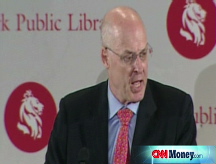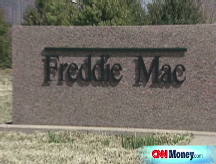New Fed rules miss one key lending abuse
Mortgage brokers often receive kickbacks from lenders in return for steering consumers into more expensive loans - a problem that the Federal Reserve failed to address.
| 30 yr fixed | 3.80% |
| 15 yr fixed | 3.20% |
| 5/1 ARM | 3.84% |
| 30 yr refi | 3.82% |
| 15 yr refi | 3.20% |
NEW YORK (CNNMoney.com) -- Mortgage brokers and loan officers are getting paid fat fees by lenders to put unsuspecting borrowers into expensive loans. And the new lending rules issued last week by the Federal Reserve do nothing to stop this abusive practice.
The Department of Housing and Urban Development estimates that this practice cost borrowers $16 billion in 2007 alone.
"This remains a serious problem," said Howell Jackson, a professor at Harvard Law School who has testified before Congress on the subject. "It increases the cost of borrowing for lots of people, especially in the subprime space where borrowers are less experienced."
At issue is the so-called yield spread premium: The difference between the lowest interest rate that a borrower qualifies for and the actual rate that a lender charges.
The larger the yield spread, the more a loan originator earns, and that can tempt them to steer borrowers to bad loan.
Say a couple buys a new house and qualifies for a 6.5% rate on a 30-year fixed mortgage. A greedy broker or loan officer might put the couple in a 7% loan so that he earns a bigger payday, or even a 7.25% loan. Loan originators usually earn about 1% of the loan value for every extra quarter point of interest they charge borrowers. So if they put naive home buyers into high-cost loans, such as hybrid adjustable rate mortgages or option arms, they could make 5% or more on a loan.
Most home buyers never realize that they are paying any additional costs. Federal rules dictate that brokers can disclose these fees with just a footnote in the closing papers that's easily overlooked. Loan officers, who work directly for lenders, are not required to disclose it at all.
"In subprime loans, brokers could easily make an extra 2 percentage points," said Jackson. "On $500,000 loans, that's well in excess of $10,000, as much as a 10-fold increase over what most people would consider fair compensation."
When the Fed first floated its new lending regulations last year, it did include a proposal to limit the practice of lender payoffs to brokers, but that didn't make it into the final set of regulations. The rules that were passed limit prepayment penalties, require proof of assets and income, and require that lenders consider whether borrowers can afford a loan before it's issued.
The Fed said it dropped the Yield Spread Premium rule because consumer testing indicated that people were confused by it. Disclosing broker fees led many to assume that it's less expensive to go directly to a lender for a loan, which isn't necessarily true.
Not surprisingly, mortgage brokers opposed the rule, pointing out that it would have required them, but not lenders, to disclose their total compensation in a written agreement before their fees were be rolled into the loan. Right now fees aren't fully disclosed until the closing.
Besides, said Marc Savitt, president of the National Association of Mortgage Brokers, this kind of abuse is a thing of the past. The now moribund housing market has spawned cutthroat competition, so brokers have had to slash their fees and improve loan terms to win clients over.
Still, the Fed plans to address the problem. A spokesman says it will focus its efforts on improving fee disclosures so that consumers will more readily understand what they are paying and why.
There's also legislation sponsored House Financial Services Chairman Barney Frank, D-Mass., that would ban lenders from paying fees to broker based on loan terms. The bill passed the House last year as part of an anti-predatory lending act, but it has since languished in the Senate.
Additionally, the Department of Housing and Urban Development is working on its own version of a rule to govern Yield Spread Premiums, according to HUD spokesman Brian Sullivan.
"Mortgage rules are 30 years old," he said, "and don't reflect the way people finance their homes today."
HUD's rule would require lenders and brokers to fully disclose payments made by lenders to brokers, and that such payments somehow translate into lower costs for consumers. But it's drawing opposition. The agency is now taking comments on the proposed regulation, and has received 12,000 so far.
"We're getting a rash of pushback from industry sources who would prefer we do nothing," said Sullivan.
States are also taking action. North Carolina recently banned Yield Spread Premiums tied to sub prime mortgages, joining about 10 or 12 other states in curbing their use, according to the Center for Responsible Lending.
"The states will always be in the best position to act more quickly to help homeowners in their own backyards," said CRL president, Michael Calhoun.
Earlier this year, Massachusetts attorney general Martha Coakley issued regulations that outlawed commissions tied to putting borrowers into expensive loans.
For its part, Minnesota passed a new state law requiring that brokers act in the best interests of their clients, much as an attorney or financial advisor must do. Other states will likely follow suit.
"These types of abuses have the potential to emerge again if we don't take some legislative steps," said Howell Jackson. ![]()




